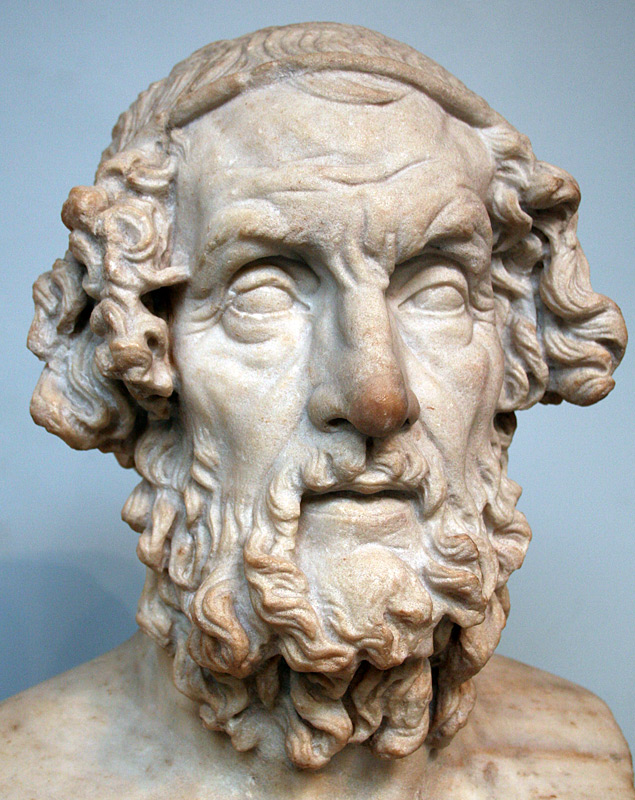VI. 142–143 (tr. Robert Fagles).
Iliad (c. 750 BC)
Homér Quotes
Δοιαὶ γάρ τε πύλαι ἀμενηνῶν εἰσὶν ὀνείρων·
αἱ μὲν γὰρ κεράεσσι τετεύχαται, αἱ δ' ἐλέφαντι.
οἵ ῥ' ἐλεφαίρονται, ἔπε' ἀκράαντα φέροντες·
οἳ δὲ διὰ ξεστῶν κεράων ἔλθωσι θύραζε,
οἵ ῥ' ἔτυμα κραίνουσι, βροτῶν ὅτε κέν τις ἴδηται.
XIX. 563–568 (tr. Robert Fagles); spoken by Penelope.
Odyssey (c. 725 BC)
“The blessed gods have no love for crime.
They honor justice, honor the decent acts of men.”
XIV. 83–84 (tr. Robert Fagles).
Odyssey (c. 725 BC)
XIII. 79–80 (tr. Robert Fagles).
Odyssey (c. 725 BC)
“The recklessness of their own ways destroyed them all.”
I. 7 (tr. Robert Fagles).
Odyssey (c. 725 BC)
“A deep sleep took hold upon him and eased the burden of his sorrows.”
XXIII. 343–344 (tr. Samuel Butler).
Odyssey (c. 725 BC)
“When a Man's exhausted, wine will build his strength.”
VI. 261 (tr. Robert Fagles).
Iliad (c. 750 BC)
“Friends, we're hardly strangers at meeting danger.”
XII. 209 (tr. Robert Fagles).
Odyssey (c. 725 BC)
XXIV. 477–479 (tr. Robert Fagles).
Iliad (c. 750 BC)
“I hate saying the same thing over and over again.”
XII. 453–454 (tr. Samuel Butler).
Odyssey (c. 725 BC)
“These things surely lie on the knees of the gods.”
I. 267. Cf. Iliad XVII. 514.
Odyssey (c. 725 BC)
“His cold remains all naked to the sky,
On distant shores unwept, unburied lie.”
XI. 72–73 (tr. Alexander Pope); of Elpenor.
Odyssey (c. 725 BC)
“Easily seen is the strength that is given from Zeus to mortals.”
XV. 490 (tr. R. Lattimore).
Iliad (c. 750 BC)
“Then Ulysses rejoiced at finding himself again in his own land, and kissed the bounteous soil.”
XIII. 353–354 (tr. Samuel Butler).
Odyssey (c. 725 BC)
XI. 593–598 (tr. William Broome); of Sisyphus.
Odyssey (c. 725 BC)
XII. 351–352 (tr. Robert Fagles).
Odyssey (c. 725 BC)
IV. 350–351 (tr. R. Lattimore).
Iliad (c. 750 BC)
“Shameless they give, who give what's not their own.”
XVII. 451–452 (tr. Alexander Pope).
Odyssey (c. 725 BC)
XII. 342–343 (tr. Robert Fagles).
Odyssey (c. 725 BC)
XVI (tr. Samuel Butler); Hector to Patroclus.
Iliad (c. 750 BC)
VIII. 306–308 (tr. R. Lattimore); the death of Gorgythion.
Alexander Pope's translation:
: As full-blown poppies, overcharged with rain,
Decline the head, and drooping kiss the plain, —
So sinks the youth; his beauteous head, depressed
Beneath his helmet, drops upon his breast.
Iliad (c. 750 BC)
“But the will of Zeus will always overpower the will of men.”
XVI. 688 (tr. Robert Fagles).
Iliad (c. 750 BC)
VI. 232–236 (tr. R. Lattimore).
Iliad (c. 750 BC)
“The chief indignant grins a ghastly smile.”
XX. 301–302 (tr. Alexander Pope).
Odyssey (c. 725 BC)
XI. 489–492 (tr. Robert Fagles); Achilles' ghost to Odysseus.
Alexander Pope's translation:
: Rather I'd choose laboriously to bear
A weight of woes, and breathe the vital air,
A slave to some poor hind that toils for bread,
Than reign the sceptred monarch of the dead.
With many a weary step, and many a groan,
Up the high hill he heaves a huge round stone;
The huge round stone, resulting with a bound,
Thunders impetuous down, and smokes along the ground. P. S. Worsley's translation:
: Rather would I, in the sun's warmth divine,
Serve a poor churl who drags his days in grief,
Than the whole lordship of the dead were mine.
Odyssey (c. 725 BC)
XXIII. 315–318 (tr. R. Lattimore).
Iliad (c. 750 BC)
“The Fates have given mortals hearts that can endure.”
XXIV. 49 (tr. Robert Fagles).
Iliad (c. 750 BC)
“Bad herdsmen waste the flocks which thou hast left behind.”
XVII. 246 (tr. Worsley).
Odyssey (c. 725 BC)
IV. 195–198 (tr. Robert Fagles).
Odyssey (c. 725 BC)
XVII. 320–323 (tr. Worsley).
Odyssey (c. 725 BC)
“Lordship for many is no good thing. Let there be one ruler,
one king.”
II. 204–205 (tr. R. Lattimore).
Iliad (c. 750 BC)
“Grey-eyed Athene sent them a favourable gale, a fresh West Wind, singing over the wine-dark sea.”
II. 420–421 (tr. S. H. Butcher and Andrew Lang).
Odyssey (c. 725 BC)
“From whose lips the streams of words ran sweeter than honey.”
I. 249 (tr. Richmond Lattimore); of Nestor.
Iliad (c. 750 BC)
XVI (tr. S. Butler); Patroclus to Hector.
Iliad (c. 750 BC)
IX. 63–64 (tr. Alexander Pope).
Iliad (c. 750 BC)
“So here the twins were laid low at Aeneas' hands,
down they crashed like lofty pine trees axed.”
V. 559–560 (tr. Robert Fagles).
Iliad (c. 750 BC)
I. 528–530 (tr. Richmond Lattimore).
Iliad (c. 750 BC)
“A glorious death is his
Who for his country falls.”
XV. 496–497 (tr. Lord Derby); spoken by Hector.
Iliad (c. 750 BC)
XX. 248–249 (tr. R. Lattimore).
Iliad (c. 750 BC)
III. 48 (tr. Robert Fagles).
Odyssey (c. 725 BC)
